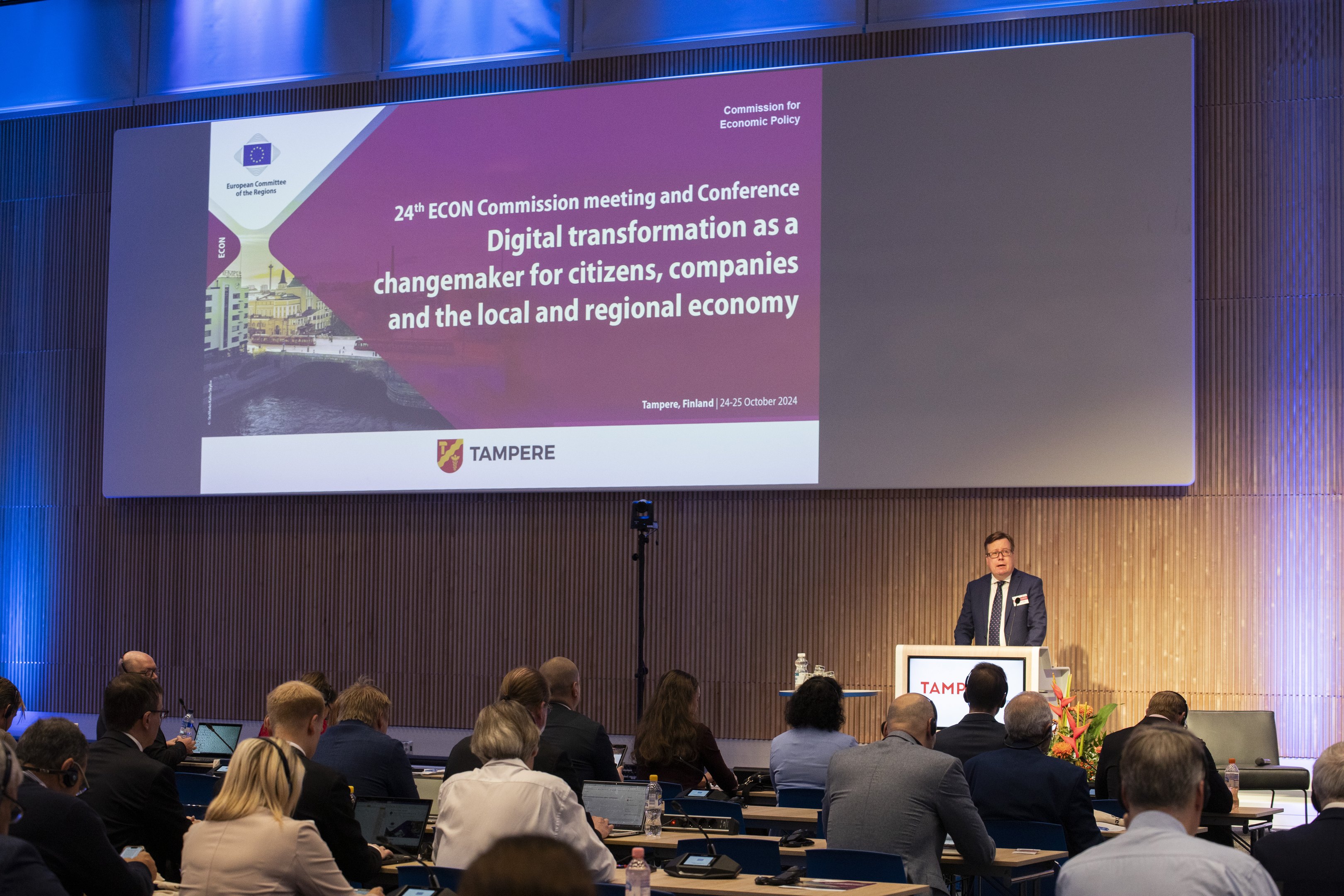Local leaders mobilise to put artificial intelligence at work for citizens through enhanced public services
The European Committee of the Regions (CoR) Commission for Economic Policy (ECON) met with Finnish top representatives on 24 and 25 October in Tampere, Finland, to discuss how to boost the adoption of Artificial Intelligence for innovative solutions in the public sector.
Local and regional authorities play a crucial role in AI adoption across the EU, acting as catalysts for innovation by promoting responsible AI development in sectors such as energy efficiency, transport, education, health, and public services. The meeting and conference of the ECON commission featured discussions on how AI can enhance public-service delivery, improve efficiency, and foster innovation at the local and regional level. ECON members emphasised the urgent need for local authorities to embrace AI technologies to better serve their citizens.
AI's potential to improve public-service efficiency through automation, optimisation, and enhanced citizen interaction was highlighted by CoR members during the conference, alongside the need to prevent an 'AI gap' between administrations that can fully utilise these technologies and those that cannot. The conference featured presentations that emphasised these points, showcasing successful AI implementations in cities like Tampere, Munich, Sofia and the Agency for Digital Modernisation in the region of Galicia, Spain.
During the meeting in Tampere, ECON members adopted the draft opinion on “Challenges and Opportunities of Artificial Intelligence in the Public Sector: Defining the Role of Regional and Local Authorities”, which puts forward a number of recommendations on how to boost the adoption of AI solutions by cities and regions.
Members highlighted that AI can foster real opportunities for progress and well-being only if used transparently, traceably, and neutrally. Recognising AI as a technology that enhances human functions, the opinion clarifies that AI replicates and accelerates human processes without replacing human creativity or activities. The opinion also underlines that a legislative framework alone will not suffice without substantial programs to enhance citizens’ awareness and education. ECON members encouraged the investment into training of staff, lifelong upskilling, recruitment and retaining of experts and creation of local AI ecosystems benefitting from cooperation between public and private entities, including also academia so that AI systems will be made accessible to those in need.
Quotes:
Dainis Turlais (LV/Renew E.), Chair of the ECON Commission and member of Rīga City Council: “Regional and local authorities face both challenges, as well as opportunities with AI adoption. Challenges include resource constraints, digital literacy, and privacy concerns. However, AI offers opportunities for smarter urban planning, efficient public services, and data-driven policies. By embracing AI responsibly, local governments can enhance citizen engagement and improve community well-being. That’s why we are devoting the ECON commission meeting and conference to these important topics.”
Anna-Kaisa Ikonen, Minister of Local and Regional Government in Finland: “Digital tools and AI technologies have become an essential part of society. A human-centered approach is essential for making sure that local and regional authorities can provide improved and personalized public services using new technologies.”
Alberto Cirio (IT/EPP), President of the Piedmont region and rapporteur on the opinion: "The proposals approved today by the ECON Commission addressed the major issue of AI from the perspective of regions, cities, and all European local authorities, regardless of their size. We highlight the great opportunities that AI offers to the regional and local public administration, while stressing the need to always safeguard users rights and to promote the ethical use of AI. We must not forget that, just as the action of public administrations must have citizens at their center and as their ultimate goal, AI must be developed starting from the human being and its needs. AI is not the magic solutions to our problems, it is a human tool and should be considered and developed as such, with a view to greater efficiency and better performance of administrations, but also with the potential to provide citizens with entirely new services."
Also during the meeting:
ECON members further adopted two draft opinions:
-
“Proposal for a regulation on the screening of foreign investments in the Union” drawn up by rapporteur Pehr Granfalk (SE/EPP), Member of Solna Municipal Council
-
“The future of the single market and the EU's competitiveness” prepared by rapporteur Martijn van Gruijthuijsen (NL/Renew), Member of the Provincial States of the province of North Brabant
More information:
In August 2024, the AI Act as the first-ever comprehensive European legal framework on AI came into force to support the development of trustworthy AI at EU level. The aim of the new rules is to ensure that AI systems respect fundamental rights, safety, and ethical principles and by addressing risks of very powerful and impactful AI models.
Re-watch the meeting here.
Contact:
Theresa Sostmann








